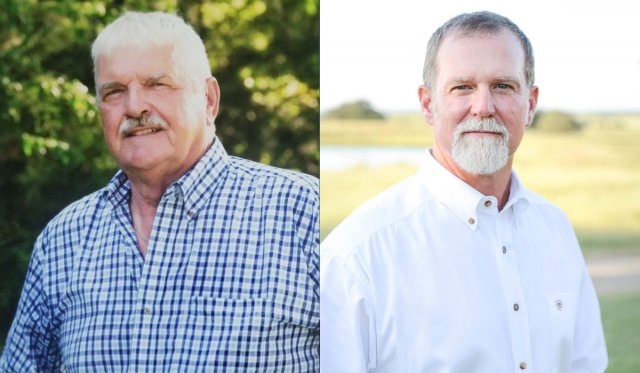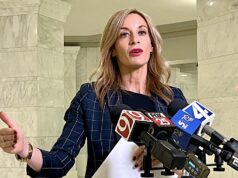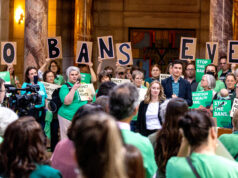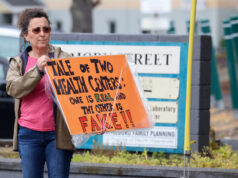
The candidates for Oklahoma Senate District 7 were scheduled to appear at a forum Thursday, Oct. 15, but then came a disagreement about face masks.
District 7’s largest local newspaper, the McAlester News-Capital, had organized the forum, hoping to let candidates discuss their platforms.
But Warren Hamilton, the Republican candidate, disagreed with the News-Capital’s policy requiring masks. The paper cancelled the event as a result.
While Hamilton did not respond to multiple interview requests for this story, he previously told NonDoc he believes government intervention in COVID-19 responses should be limited and the pandemic should be treated like flu season.
Hamilton’s competition for the SD 7 seat, Democrat Jerry Donathan, disagrees.
“I believe in the guidelines set down by the CDC,” Donathan said. “And it’s been proven that wearing masks and safe distancing has reduced the spread.”
The candidates did eventually meet for a debate, hosted by the Veterans of Foreign Wars in Wilburton on Oct. 24, after constituents raised concerns about not being able to hear the candidates voice their opinions. Masks were not required.
On paper, the two candidates have some similarities. Donathan was drafted into the U.S. Navy during the Vietnam War. After completing his training, he served four years in the Navy before returning to Oklahoma and joining the Oklahoma National Guard. He now owns a ranching operation with his wife, Barbara.
Hamilton is also a military veteran. He graduated from West Point in 1993 and went on to spend most of his young adult life serving in the Army overseas. He also served as a military contractor in Iraq. Now Hamilton and his wife, Sherrie, run the ranch he grew up on.
Neither candidate has run for office before.
But despite their similar backgrounds, the two candidates often disagree on one of the community’s most pressing questions and on larger issues involving the role of government.
Since 2012, SD 7 has been represented by Sen. Larry Boggs (R-Wilburton), whom Hamilton defeated in a heated runoff election for the Republican nomination in August. The district lies in southeastern Oklahoma and includes areas in Haskell, Hughes, Latimer, Okfuskee and Pittsburg Counties.
On abortion and the role of government
For Hamilton, President Donald Trump provides a model for the ideal candidate. He considered Trump a gun protector, an honest leader and, most importantly, a champion of Christian values.
“Donald Trump is the most pro-life president we’ve ever had,” Hamilton said at the VFW debate. “He’s the only president after Kennedy who’s actually called on the name of Jesus Christ. And that speaks volumes to me, and I hope it does for every American.”
Hamilton believes strongly that the government should protect religious freedom. Actively opposing abortion, he often says, is key to securing this freedom.
When he spoke to NonDoc in August, Hamilton mentioned his anti-abortion stance in almost every answer he gave. He said he views the issue as a sort of litmus test for all politics.
“I believe that really everything we do is kinda interrelated,” he said in August. “If we get it wrong on abortion, then we’re gonna get it wrong everywhere.”
Hamilton likes to point to his pro-life stance as a key issue on which he and his opponent diverge.
Donathan said he believes it would be an overstep of government power to dictate women’s medical care.
“People are in favor of a woman’s right due to medical reasons, and that’s where I come from,” he explained. “And I’m not a doctor, but it goes back to their rights and their faith in God.”
Donathan said he understands that many of the people he is running to represent do not share his thoughts on a woman’s right to choose.
One of his central campaign promises, he said, is to listen to both sides of controversial issues before making policy decisions.
“I may not agree with everyone,” he said, “but I’m going to be willing to listen to all of our constituents and to try to reason and come up with good solutions for our problems.”
However, while Donathan is open to discussing his stances on social issues, he said he believes they have limited relevance to local legislation.
Instead, Donathan says he is running on issues that hit closer to home, including advocating for a new sewage and water system, bringing more jobs to the area and improving the district’s damaged roads.
National issues and local realities
Donathan said he is a proponent of keeping local politics local. While he encourages political participation at the federal level, he believes many of the issues discussed there have little bearing on the State Senate job for which he is applying.
One issue where he sees this most clearly is protecting the Second Amendment.
“The Second Amendment gets the votes and gets people, you know, stirred up about, ‘The left’s gonna take your guns,'” he said. “It’s a game that’s been played for 40 years.”
While the Democratic candidate boasts his own gun collection, he said the Second Amendment is a federal issue. For him, it seems like a “waste of time” to be discussing gun rights in a local election.
Hamilton, however, has made protecting the right to bear arms a central campaign promise.
“So-called ‘gun control’ is more accurately and honestly described as ‘liberty control’ or ‘people control,'” he states on his campaign website. “I will never support any law that infringes on any human right.”
Hamilton believes these social questions should be addressed at both the federal and the state level.
Often, Hamilton’s campaign materials also advocate for Trump in the upcoming presidential election.
When asked of his opinion of Trump at the October 24 debate, Donathan said he did not approve of the president’s job performance.
However, he went on to express that he believed that people’s stances on national politics should not have much effect on their choice for State Senate.
“The national politics is everyone’s prerogative,” he said. “They can vote for him if they think he’s doing a good job. That’s fine.”
The State Senate’s efforts, Donathan said, would be better spent addressing the district’s lacking infrastructure.
“But in the states, we’ve got to look at the states,” he said.





















